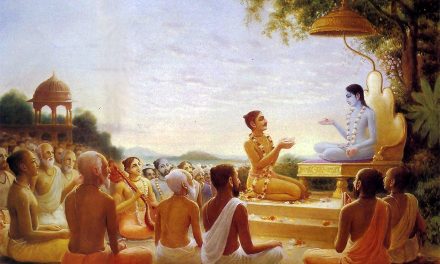kurvann eveha karmani
jijivisec chatam samah
evam tvayi nanyatheto ‘sti
na karma lipyate nare
“A person may desire to live for hundreds of years if he works according to this truth [of the first mantra], because that sort of work will not bind him to the law of karma. And there is no alternative to this way for man.”
The second mantra of the Sri Ishopanishad refers to karma-yoga, or devotional service. If a person understands the first mantra of the Sri Ishopanishad – that everything belongs to God, including one’s body, possessions, and very self-and lives according to this truth by dovetailing his life in the loving service of God, then he is engaged in what is called karma-yoga. “Karma” means “action,” and “yoga” means “united with God” or “united with the Absolute Truth.”
Everyone is engaged in action. The law of karma means that there are reactions to every action and that a person must endure the reactions to his actions. As Jesus Christ taught, “As you sow, so shall you reap.”
A person is not the body; he is eternal spirit soul, residing only temporarily in the body. The particular body a person has is due to his past activities, his past life. No one chooses where they will be born, or even in what species of life they will be born. Some living entities are in dog and cat bodies, others are in bird bodies, and so on. So many different types of bodies are provided by material nature, and the particular type of body given to the spirit soul depends on his past karma and his desires at the time of death. The eternal spirit soul is bound up on an endless wheel of repeated birth and death caused by reaping the fruit of the seeds he has sown by his actions. Everyone is struggling for a long life, not caring that this will simply cause accumulation of karma and thus rebirths.
Every action, good or bad, produces some karmic reaction. Actions that are “bad” create bad karmic reactions. A person who engages in heinous criminal actions or who lives simply like an animal, exploiting others, will have to eat the bitter fruit of such actions in the future.
Actions that are described in scripture as “good” or “pious” create good karma. A person who wishes, after the death of his body, to enjoy a more pleasurable material life in some heavenly planet or on earth, is often very careful to engage in pious actions. His aim is increased sensual pleasure, both now and in the future. Thus, both “bad” and “good” karma create karmic reaction, which forces a person to take on another material body-even if it is in the heavenly material planets. And wherever there is matter, there is birth and death. As the Lord states in the jewel of the Vedas, the Bhagavad-gita:
“For one who is born, death is certain; and for one who dies, birth is certain.” – Bhagavad-gita 2:27
The yogi or transcendentalist does not want to be born again in the material world. He wants to transcend the wheel of birth and death, which is full of suffering. Thus he does not want to create either bad or good karmic reaction. Must he then simply sit down and meditate silently until his body dies? Will any action create karmic reaction? Does he have to stop all actions, and if so, is this even possible?
The second mantra is intended for serious yogis and transcendentalists. It says that if a person’s life, his work-that is, his actions-are based on the understanding that God is the owner, controller, and enjoyer, then such actions will create neither bad nor good karmic reaction. Actions engaged in for the pleasure of God cause no karmic reaction. So one who dovetails his life in the loving service of God, who works in the Lord’s service, creates no new karmic reaction. Such activity in devotional service is called akarma, or naiskarma. Because a person engaged in devotional service produces no karmic reaction from his activities, he does not need to take on any more material bodies. At the death of his body he returns to the spiritual world, and engages there in further loving service to the Supreme Lord.
Mantra Two makes it clear that one who lives for the Lord’s pleasure, who makes God the center of his life’s work, can aspire to live for a long time in this world without any negative consequences. A long life will not bind him to the wheel of karmic reaction. He will not incur any karmic reaction no matter how long he remains here. Although appearing to live in the world of matter, the transcendentalist engaged in the loving service of the Lord, is not really in the material world; he is in the spiritual world. There is a primary difference between the material world and the spiritual dimension. In the spiritual world God is the central enjoying agent and the living beings are enjoying serving Him; whereas in the material world the living entities reject God’s Lordship and struggle to be the lords and enjoyers.
A pure loving servant of God-one who is conscious of the spiritual realm, yet who appears before those of us in the material world- is an ambassador or representative of the spiritual world. In other words, the Supreme Lord and His pure devotees can appear to exist in this material world without really being in it. To be in the material world means to be dominated by the illusory energy, maya. It means being under the laws of material nature- specifically the laws of karma. This mantra makes it absolutely clear that you can live in this world and not be under the laws of karma. By surrendering to the Supreme Lord, by serving Him out of love, you can be freed from the bondage of the illusory energy.
Indeed, you, the jiva, the individual soul, have been placed under maya and the laws of material nature specifically because of your enviousness of the Lord. As soon as you give up such envy and want to be engaged in the Lord’s loving service there is no need to be under maya’s domination. So you are released. Remember, maya is the illusory energy of God. It is God’s energy and is controlled by Him. Ultimately everyone is controlled by God and surrendered to God directly or indirectly. If a person wants to be the loving servant of the Supreme Lord, then he gets that. But if a person wants to be the Supreme Lord-master and enjoyer-then he is placed under the control of God’s illusory energy. In this condition he is in the illusion of lordship but is in fact under the strict laws of material nature.
By following this mantra a person changes his service-instead of serving maya he serves the Lord. A bona fide spiritual master, a fully realized soul, is not someone who has become master or Lord. A spiritual master is not someone who has defeated the power of maya. No. A spiritual master serves God instead of maya-but he is still serving. Everyone is dominated. Everyone serves. Our only choice is: do we serve God or maya? Do we surrender to and be dominated by God or by maya? To choose to serve God results in life, happiness and freedom. To choose to serve maya results in death, misery and slavery.













Wonderful information these things will help us be aware of what and why we do it. This is very important in this era. Where we could help ourselves from in value based knowledge to lead a healthy living. Thanks for giving us such useful information
Namaskaram
It has been my long cherished dream to read upanishad verses. anvayartha. with thatparyam.
I. Find the commentary here very lusid simple and absorbing
No words are enough to express my gratitude and happiness
I wish I could read rest of the verses too one by one
May god be stimulating both the writer and the reader towards the objective
Pranam